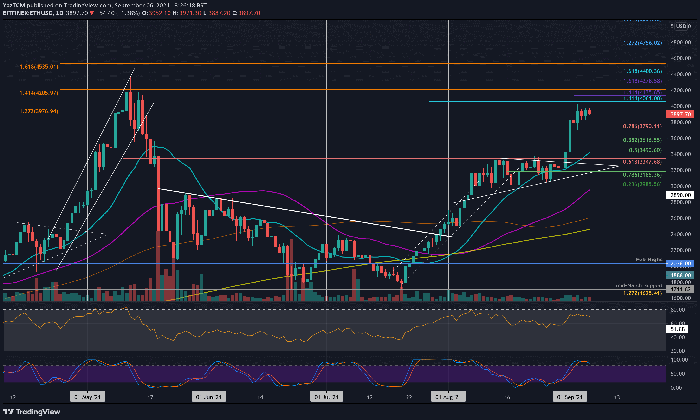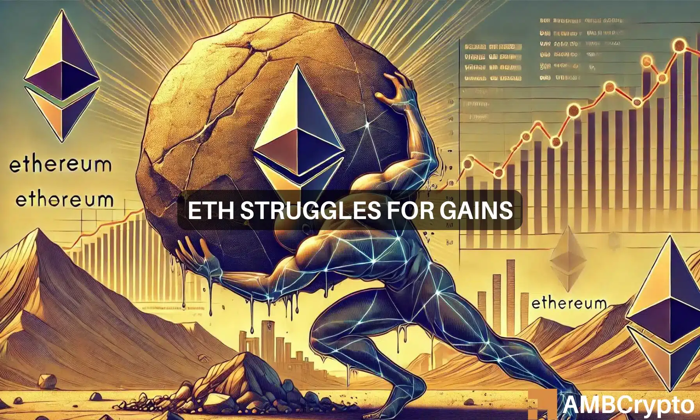Crypto ETFs are revolutionizing the investment landscape by offering a seamless way for investors to gain exposure to the growing cryptocurrency market. As institutional investment surges, these exchange-traded funds have emerged as a viable option for both seasoned and new investors. Notably, with the recent launch of futures XRP ETFs, the conversation surrounding digital assets is more vibrant than ever. Ripple CEO Brad Garlinghouse has emphasized the transformative role of such financial instruments, particularly how Bitcoin ETFs opened significant doors for traditional finance. With major players like BlackRock taking the lead, the potential for XRP ETFs and others to join the fray is generating considerable excitement within the industry.
Digital asset exchange-traded funds, commonly known as crypto ETFs, have become key instruments in bridging traditional finance and the burgeoning field of cryptocurrency. Recent discussions are centered around the implications these funds have for wider accessibility and institutional participation in digital currencies. As the landscape evolves, figures like Ripple’s CEO, Brad Garlinghouse, are highlighting the significance of offerings such as Bitcoin ETFs and upcoming XRP ETFs. These funds not only simplify exposure to volatile assets but also hint at a more institutionalized investment approach in the cryptocurrency arena. As more spot funds gain approval, the dynamics of wealth and asset accumulation in the digital realm are rapidly changing.
Understanding the Impact of Crypto ETFs on the Market
Crypto ETFs, or Exchange-Traded Funds, play a crucial role in bridging traditional finance and the cryptocurrency market. By allowing investors to gain exposure to digital currencies without the need to hold the assets directly, these financial instruments have transformed how institutional investors approach the crypto landscape. As Ripple CEO Brad Garlinghouse pointed out, the recent introduction of Bitcoin ETFs has opened the doors for broader institutional participation, enabling entities like pension funds and endowments to enter the market more cautiously.
Moreover, the approval of various crypto ETFs has sparked curiosity around other cryptocurrencies, particularly XRP, which is vying for its own spot ETF. With Bitcoin leading the charge, this growing acceptance and mainstream integration of cryptocurrencies are reshaping financial ecosystems. As products evolve, the landscape becomes increasingly competitive, prompting both investors and corporations to reassess their strategies in light of the new investment vehicles available such as XRP ETFs.
The Rise of Institutional Investment in Cryptocurrency
Institutional investment in cryptocurrencies has surged markedly since the introduction of Bitcoin ETFs. Financial giants are now recognizing the potential of these digital assets as viable investment options, leading to increased allocations and interest from institutional funds. This shift is not just about increasing capital flow; it’s also about enhancing credibility in the cryptocurrency market. As seen with BlackRock’s BTC ETF success, record-breaking inflows indicate heightened confidence among larger investors, fundamentally altering perceptions of digital assets.
The influence of institutional investment is not limited to Bitcoin; it extends to altcoins such as XRP, SOL, and DOGE, all of which are potential candidates for their own ETFs. The demand for more diversified investment options is palpable among institutional clients who are exploring potential exposure beyond Bitcoin. Consequently, as cryptocurrencies gain traction, traditional finance institutions are keenly interested in creating products that cater to this growing market, boosting the appeal and stability of the overall investment landscape.
Crypto ETFs: Gateways for Retail Investors
While institutional investors have significantly benefited from crypto ETFs, retail investors are also finding new opportunities to engage with the cryptocurrency market. These financial products simplify the process of investing in digital currencies, enabling individuals to purchase shares of ETFs tied to the performance of specific cryptocurrencies. This model not only reduces the technical hurdles associated with owning cryptocurrencies directly but also protects investors with established regulatory oversight.
The growing interest in crypto ETFs opens up avenues for retail investors to diversify their portfolios. With products linked to popular cryptocurrencies like Bitcoin and Ethereum now being traded on Wall Street, retail investors are gaining confidence in participating in this dynamic market. As familiarity with crypto ETFs increases, they potentially become a significant gateway for the masses to contribute to the evolving cryptocurrency ecosystem as regulators continue to adapt to the new financial landscape.
The Future of XRP ETFs: Potential and Predictions
The potential for XRP ETFs remains high amid ongoing SEC deliberations regarding crypto regulations. As Brad Garlinghouse highlighted, the anticipation for a spot XRP ETF is palpable, especially considering the apparent appetite for such products among investors. Current market speculation indicates promising opportunities, with predictions stating an 80% chance for XRP ETFs to launch before year’s end, which speaks volumes about the eagerness for enhanced investment options in Ripple’s native cryptocurrency.
Moreover, the anticipated approval for XRP ETFs would represent a significant milestone not only for Ripple but also for the broader cryptocurrency market. If the SEC grants approval, it could lead to a rush of investment funds toward XRP, further validating its legitimacy and boosting its market position. Ripple’s ability to leverage the success of Bitcoin and Ethereum ETFs may catalyze interest and institutional support for XRP, illustrating the interconnected nature of these financial instruments.
Navigating the Evolving Landscape of Crypto Exchanges
With the emergence of crypto ETFs, the landscape of cryptocurrency exchanges is also undergoing major changes. Traditional exchanges are now compelled to adapt by implementing features that cater to both institutional and retail investors seeking exposure to digital assets. This shift is marked by partnerships between exchanges and ETF providers, enhancing liquidity and accessibility while ensuring compliance with regulatory frameworks.
As the market grows, the services provided by crypto exchanges will need to diversify to include not just trading but also educational resources and tools that assist users in navigating this complex environment. Companies that offer crypto ETFs are likely to enhance their visibility on exchanges, as retail and institutional investors increasingly seek reliable and straightforward pathways to invest in cryptocurrencies. The interplay between exchanges and ETF products marks an exciting evolution in how cryptocurrencies are accessed and traded.
The Influence of Bitcoin ETFs on the Crypto Market
Bitcoin ETFs have acted as a catalyst for the entire cryptocurrency market, prompting increased interest and investment across a variety of digital assets. Since their launch, Bitcoin ETFs have proven to be immensely popular, leading to substantial capital inflow, especially from institutional players looking to dip their toes into cryptocurrency investments. This unprecedented demand illustrates the appetite for alternative asset classes that Bitcoin exemplifies, with other cryptocurrencies such as XRP looking to replicate this success with similar financial products.
The rise of Bitcoin ETFs has also set a precedent, showcasing the potential for further innovation within the cryptocurrency sector. Other networks are now racing to establish their own ETFs to capture a share of the growing market. As institutions and retail investors alike continue to gravitate towards Bitcoin, the ancillary benefits of such products are likely to extend to the entire cryptocurrency market, driving more comprehensive acceptance of digital assets as legitimate investment vehicles.
Understanding the Key Players in Crypto ETFs
The landscape of crypto ETFs is characterized by a prominent list of players including large asset management firms like BlackRock and Fidelity. These entities have recognized the burgeoning demand for cryptocurrency exposure and have taken decisive steps to launch their own ETF products. As seen with BlackRock’s Bitcoin ETF, the involvement of such heavyweights provides an added layer of credibility to the financial instruments, ultimately boosting investor confidence.
In addition to these major players, smaller firms are also joining the fray, developing innovative products that cater to specific market niches, including XRP ETFs. This multi-tiered approach creates a more competitive environment, fostering innovation and encouraging diverse investment strategies among institutions and individual investors. As new players enter the market, the diversity of ETF offerings continues to expand, reflecting the dynamic nature of the cryptocurrency space.
Regulatory Challenges and Crypto ETFs
The development and approval of crypto ETFs have been significantly influenced by regulatory challenges. Agencies like the SEC have been cautious in their approach to ensuring that these financial products meet stringent guidelines aimed at protecting investors and maintaining market integrity. As Ripple and other companies await ETF approvals, understanding the regulatory landscape becomes crucial for market participants looking to navigate these complexities.
Despite these hurdles, the potential for crypto ETFs remains strong, as evidenced by the successful approvals of Bitcoin and Ethereum product offerings. Industry advocates continue to push for clearer regulations that will facilitate the entry of more ETFs, including those concentrated on digital currencies like XRP. As the regulatory environment evolves, it will directly impact how quickly and aggressively the market embraces innovative financial instruments tied to cryptocurrencies.
The Role of Public Perception in Crypto ETFs
Public perception is a critical component in the success of crypto ETFs. As cryptocurrencies have historically faced skepticism and volatility, the approval and performance of ETFs offer a new lens through which the public can view these digital assets. The education provided by successful ETF launches can help demystify cryptocurrency investments, making them more approachable for average investors who may have been hesitant to engage directly with cryptocurrencies.
Furthermore, as more high-profile companies and institutional investors begin to embrace crypto ETFs, public sentiment often shifts, leading to increased participation. The visibility of ETFs on mainstream financial platforms also aids in fostering a better understanding of cryptocurrencies, which could change how the general public perceives digital assets. By navigating these cultural shifts, the crypto industry can enhance its acceptance and integration into traditional financial markets.
Frequently Asked Questions
What are crypto ETFs and how do they impact the cryptocurrency market?
Crypto ETFs, or exchange-traded funds that focus on cryptocurrency assets, provide a way for investors to gain exposure to a range of digital currencies without actually buying them directly. They impact the cryptocurrency market by enabling institutional investment and increasing overall market liquidity. As barriers are lowered through products like Bitcoin ETFs, larger players can more easily enter the space, thereby driving demand and potentially stabilizing prices.
How do XRP ETFs differ from Bitcoin ETFs in terms of institutional investment?
XRP ETFs and Bitcoin ETFs serve similar purposes in facilitating institutional investment in cryptocurrencies, but they differ in their market acceptance and regulatory approval. While Bitcoin ETFs have gained significant traction and approval in the U.S., XRP ETFs are still awaiting a spot approval from regulatory bodies. This difference highlights the ongoing regulatory challenges that XRP faces, making Bitcoin ETFs currently more accessible for institutional investors.
What advantages do Bitcoin ETFs offer for institutional investors compared to direct cryptocurrency purchases?
Bitcoin ETFs provide several advantages for institutional investors compared to direct cryptocurrency purchases, including easier access to market opportunities on traditional exchanges, regulatory compliance, and more straightforward portfolio management. They eliminate the need for self-custody solutions and complex logistics associated with purchasing Bitcoin through exchanges, which can pose risks for larger funds.
Will the approval of new crypto ETFs influence the future of institutional investment in cryptocurrency?
Yes, the approval of new crypto ETFs is likely to significantly influence the future of institutional investment in cryptocurrency. As more cryptocurrencies like Ethereum and XRP potentially enter the ETF space, institutions are expected to diversify their exposure beyond Bitcoin, thus continuing to institutionalize the entire market. This trend could lead to increased liquidity and broader acceptance of cryptocurrencies in mainstream finance.
Why are BlackRock’s Bitcoin ETF and its inflows important for the future of crypto ETFs?
BlackRock’s Bitcoin ETF has become a benchmark in the crypto ETF landscape due to its record inflows and substantial assets under management. Its success indicates strong institutional interest in Bitcoin and reflects growing confidence in crypto ETFs as vehicles for investment. This could pave the way for more future crypto ETFs, including those for other digital currencies, boosting the entire cryptocurrency market.
What factors are affecting the approval timeline for XRP ETFs in the U.S.?
The approval timeline for XRP ETFs in the U.S. is primarily influenced by regulatory considerations and the ongoing scrutiny from the SEC regarding XRP’s status as a security. Delays in decision-making can stem from market dynamics, public interest, and the SEC’s varying positions on cryptocurrency regulations. Despite high anticipation, the regulatory clarity on XRP is needed to facilitate a successful ETF launch.
How have futures XRP ETFs been received in the current cryptocurrency market?
Futures XRP ETFs have been positively received in the current cryptocurrency market, marking a significant step for XRP’s integration within formal financial structures. While they currently offer limited exposure compared to spot ETFs, they represent a growing interest in XRP and signal a potential future where spot XRP ETFs could be approved.
What role does the Ripple CEO see crypto ETFs playing in the evolution of the cryptocurrency industry?
Ripple CEO Brad Garlinghouse sees crypto ETFs as a pivotal evolution in the cryptocurrency industry, particularly in enhancing institutional access to digital assets. He believes that the introduction of such financial products signifies a turning point where major investors can engage with cryptocurrencies more confidently, thus driving broader market participation and acceptance.
| Key Point | Details |
|---|---|
| Role of Crypto ETFs | Crypto ETFs allow institutional investors to gain exposure to cryptocurrencies through traditional financial markets, providing easier access compared to direct trading. |
| Market Evolution | The approval of Bitcoin and Ethereum spot ETFs has set a precedent, paving the way for other cryptocurrencies like XRP and SOL to potentially follow. |
| Institutional Demand | BlackRock’s Bitcoin ETF (IBIT) has seen significant inflows, demonstrating a strong demand for crypto ETFs among institutional investors. |
| Future Outlook for XRP ETF | While futures-based XRP ETFs have launched, the SEC is still deliberating on spot ETF requests, with varying probabilities of approval. |
Summary
Crypto ETFs are transforming the landscape of digital asset investment, providing institutional investors with streamlined access to the cryptocurrency market. With the successful introduction of futures and spot ETFs, the momentum for additional products is growing, indicating a bright future for crypto ETFs. This paradigm shift is not only making the cryptocurrency market more accessible but also attracting substantial institutional capital previously on the sidelines, enhancing legitimacy and stability in this evolving space.
Crypto ETFs are revolutionizing how investors access the burgeoning digital asset landscape, bringing institutional investment into the spotlight. With the recent approval of futures XRP ETFs in the United States, the excitement around cryptocurrency exchange-traded funds has reached new heights. Ripple CEO Brad Garlinghouse has highlighted the pivotal role that these funds play in legitimizing the cryptocurrency market, attracting a wave of institutional participants who previously hesitated. The introduction of Bitcoin ETFs in early 2024 marked a substantial shift, allowing funds like BlackRock’s to manage billions in assets seamlessly. As we continue to see regulations evolve, the future of crypto ETFs, particularly concerning XRP and other digital currencies, appears promising and vital for the overall growth of the sector.
In recent months, exchange-traded funds focusing on digital currencies, commonly referred to as crypto ETFs, have gained significant traction among investors. These financial instruments offer a new way to gain exposure to cryptocurrencies without direct ownership, making it easier for traditional investors to participate. As the market matures, the interest from institutional players has surged, particularly with the traction gained by funds linked to major coins like Bitcoin and Ethereum. The Ripple ecosystem is now also joining the conversation with potential futures-based products on the horizon. This shift signifies a broader acceptance and integration of cryptocurrencies into mainstream finance, paving the way for innovative investment strategies.














